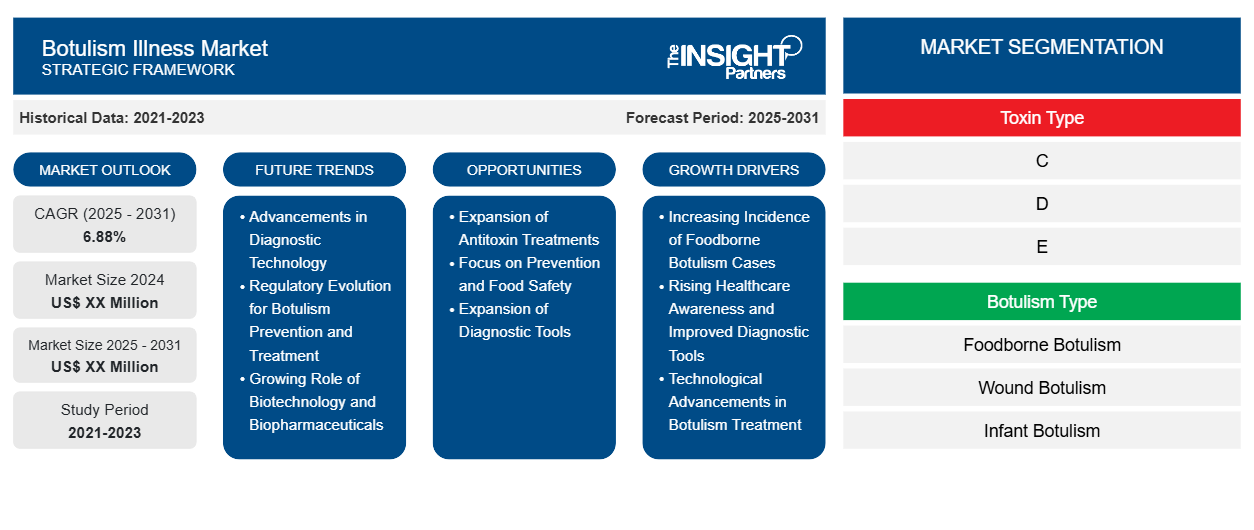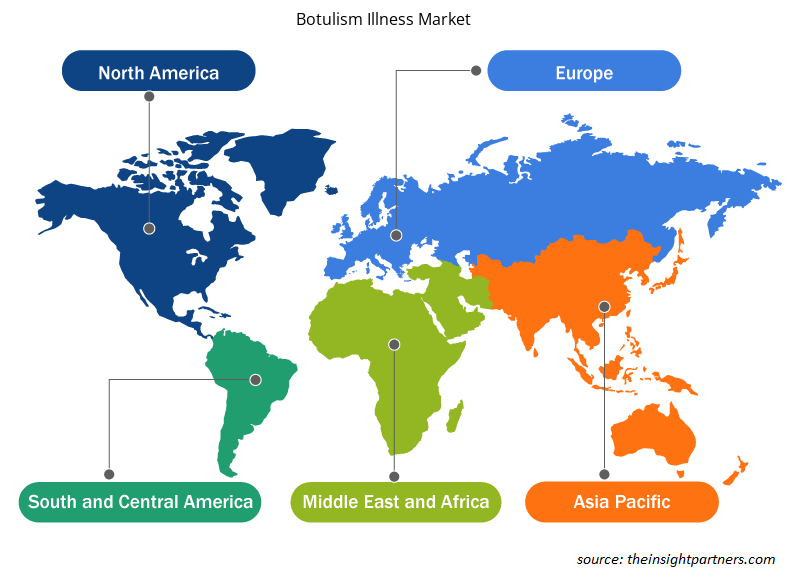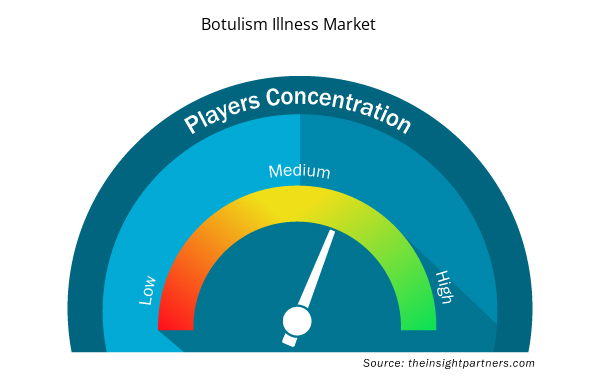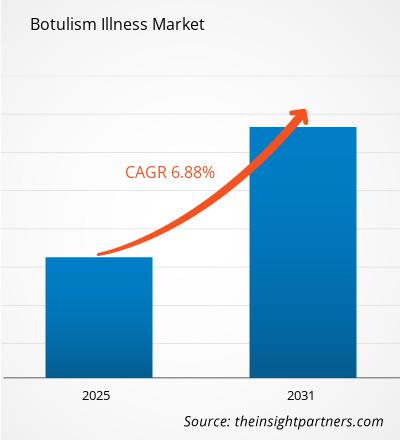The Botulism Illness Market is expected to register a CAGR of 6.88% from 2025 to 2031, with a market size expanding from US$ XX Million in 2024 to US$ XX Million by 2031.
The research report on the Botulism Illness Market is segmented by type into botulism antitoxin, antibiotic treatments, and supportive therapies. Applications analyzed include foodborne botulism, wound botulism, and infant botulism. End-users include hospitals, pharmaceutical companies, public health organizations, and research institutions. The regional analysis covers key markets such as North America, Europe, Asia Pacific, the Middle East and Africa, and South America. The market evaluation is presented in US$ for all segmental analyses. This report examines the need for botulism treatment, including the challenges in diagnosis and management, and the role of public health initiatives in botulism prevention.
Purpose of the Report
The report Botulism Illness Market by The Insight Partners aims to describe the present landscape and future growth, top driving factors, challenges, and opportunities. This will provide insights to various business stakeholders, such as:
- Technology Providers/Manufacturers: To understand the evolving market dynamics and know the potential growth opportunities, enabling them to make informed strategic decisions.
- Investors: To conduct a comprehensive trend analysis regarding the market growth rate, market financial projections, and opportunities that exist across the value chain.
- Regulatory bodies: To regulate policies and police activities in the market with the aim of minimizing abuse, preserving investor trust and confidence, and upholding the integrity and stability of the market.
Botulism Illness Market Segmentation
Toxin Type
- C
- D
- E
Botulism Type
- Foodborne Botulism
- Wound Botulism
- Infant Botulism
Treatment Type
- Antitoxin
- Antibiotics
- Breathing Assistance
- Cathartics
End User
- Hospital Pharmacies
- Clinics
- Retail Pharmacies
Customize This Report To Suit Your Requirement
You will get customization on any report - free of charge - including parts of this report, or country-level analysis, Excel Data pack, as well as avail great offers and discounts for start-ups & universities
Botulism Illness Market: Strategic Insights

- Get Top Key Market Trends of this report.This FREE sample will include data analysis, ranging from market trends to estimates and forecasts.
Botulism Illness Market Growth Drivers
- Increasing Incidence of Foodborne Botulism Cases: The increasing global prevalence of foodborne botulism cases is one of the primary drivers of growth in the botulism illness market. With the rise in industrialized food production, the risk of botulism outbreaks associated with improper food processing, especially canned goods, improperly stored food, and preserved meats, has escalated. In recent years, outbreaks in various countries have highlighted the public health challenges posed by botulism. According to the World Health Organization (WHO), botulism remains a significant concern in both developed and developing countries, although it is less common than other foodborne illnesses. However, because botulism can lead to severe neurological effects, including paralysis and even death, it garners significant attention from health organizations. As a result, the increasing incidence of botulism cases is driving the need for better diagnostic methods, improved antitoxins, and therapies to manage the illness effectively. The recognition of botulism as a critical public health issue has prompted governments and healthcare systems worldwide to prioritize research and healthcare interventions aimed at reducing its impact. Market demand for botulism-related therapies and treatments is expected to increase as cases continue to rise, pushing pharmaceutical companies to invest in developing new solutions, including more effective botulism antitoxins and better preventive strategies for food safety. The consistent occurrence of foodborne botulism outbreaks emphasizes the urgency for continued medical innovation in this space, further propelling market growth.
- Rising Healthcare Awareness and Improved Diagnostic Tools: Another key growth driver in the botulism illness market is the increasing awareness of botulism, especially about food safety and early detection. With improvements in healthcare education and public health campaigns, awareness of botulism has grown significantly over the past few decades. Governments, healthcare organizations, and nonprofit groups have played an essential role in educating populations about the risks associated with botulism and the importance of recognizing its symptoms early. The ability to detect botulism quickly and accurately is critical to preventing severe neurological damage and improving patient recovery outcomes. As a result, there is increasing demand for advanced diagnostic tools that can detect the botulinum toxin in patients' bodies and contaminated food products more rapidly than traditional methods. Emerging diagnostic technologies, such as PCR (Polymerase Chain Reaction) tests, enzyme-linked immunosorbent assays (ELISA), and mass spectrometry, are being developed and adopted by healthcare providers to enable faster diagnosis and intervention. With quicker diagnosis, physicians are better equipped to administer life-saving treatments such as botulinum antitoxins, which significantly reduce the progression of symptoms. The growing importance of rapid diagnostics and the expansion of botulism awareness campaigns will further fuel the market for botulism diagnostics, therapies, and treatments, driving growth in this specialized medical field.
- Technological Advancements in Botulism Treatment: Technological advancements in botulism treatment, including the development of more effective and targeted therapies, are a significant driver in the botulism illness market. While botulism antitoxins have been used for decades to neutralize the botulinum toxin, recent advancements in the field are focused on improving the effectiveness, safety, and ease of administration of these treatments. New formulations and novel botulinum antitoxins, such as the heptavalent botulism antitoxin (BAT), have shown promise in clinical trials, offering broader protection against different strains of botulism toxins. The growth in personalized medicine also contributes to the development of treatments tailored to individual patients' needs, ensuring better outcomes. In addition, there is growing research into neuroprotective agents that could prevent long-term neurological damage caused by botulism toxin. The development of more efficient and rapid-acting therapies is expected to reduce recovery time and improve quality of life for patients affected by botulism. As pharmaceutical companies and research institutions continue to innovate in this field, the market for botulism treatments will expand, with a particular focus on developing more advanced, versatile, and accessible therapeutic options. The rise of biopharmaceuticals and biologics in botulism treatment will also play a role in expanding market opportunities for companies invested in developing cutting-edge botulinum toxin therapies.
Botulism Illness Market Future Trends
- Advancements in Diagnostic Technology: One of the most significant trends in the botulism illness market is the rapid evolution of diagnostic technologies. Faster and more accurate diagnostic tools for detecting botulism are essential for ensuring prompt treatment and minimizing patient risk. In recent years, significant advancements in molecular diagnostics, including PCR testing, have improved the ability to identify botulinum toxin strains in both clinical samples and food sources. Real-time PCR and other molecular diagnostic methods can detect the toxin much more quickly than traditional tests, allowing for faster diagnosis and timely intervention. These improvements in diagnostic tools are crucial, as early detection of botulism is key to administering effective treatments such as botulinum antitoxins. The growing focus on improving diagnostic speed and accuracy has sparked further investment in diagnostic equipment, making these technologies more accessible in both developed and developing healthcare markets. Forecasts suggest that as the demand for rapid, high-quality diagnostics grows, diagnostic companies will continue to innovate and introduce new tools that provide faster, more reliable results. In the future, it is expected that the botulism diagnostics segment will experience significant growth, driven by advancements in molecular biology, automation, and real-time analysis.
- Regulatory Evolution for Botulism Prevention and Treatment: The regulatory landscape for botulism prevention and treatment is evolving to address emerging needs in the market. Governments and regulatory agencies around the world are increasingly focused on improving food safety standards to prevent botulism outbreaks. This includes stricter regulations on food production, packaging, and labeling, especially in industries where foodborne botulism is most prevalent, such as canned goods and preserved meats. Concurrently, the approval process for new botulism treatments is becoming more streamlined, with increased support for clinical trials that focus on botulinum toxin-neutralizing therapies and related therapeutics. Regulatory agencies are also working to standardize the availability of botulinum antitoxins, ensuring that they are easily accessible for rapid use in clinical settings and emergency scenarios. As the regulatory environment evolves, it is expected that there will be increased collaboration between public health organizations, healthcare providers, and pharmaceutical companies. This will lead to greater alignment in the development and distribution of botulism treatments, thereby increasing the market share of approved therapies. Additionally, the regulatory focus on preventive measures and treatment options will likely drive innovation in the botulism market, ensuring that the healthcare industry is prepared to tackle future outbreaks more effectively.
- Growing Role of Biotechnology and Biopharmaceuticals: The increasing use of biotechnology and biopharmaceuticals is a key trend in the botulism illness market. With the ongoing need for effective treatments for botulism, biopharmaceuticals that target the botulinum toxin directly are becoming an important area of focus. Biologics and biotechnologically derived treatments offer the potential for faster, more effective intervention for botulism victims. The development of monoclonal antibodies and other biological therapies designed to neutralize the botulinum toxin more efficiently is gaining attention as a promising approach. These biopharmaceutical products offer higher specificity and potency, making them attractive options for managing severe botulism cases. As biotechnology continues to advance, the availability of more sophisticated treatments will help improve patient outcomes and provide better management of botulism-related complications. Forecasts indicate that the biopharmaceutical segment of the botulism illness market will expand rapidly, as more biotech firms enter the market and offer innovative therapies that address the unmet medical needs associated with botulism. This trend toward biotechnology-driven solutions also reflects broader shifts in the healthcare industry, where biologics are becoming increasingly important in the treatment of various infectious and neurological diseases.
Botulism Illness Market Opportunities
- Expansion of Antitoxin Treatments: The development and expansion of botulinum antitoxin treatments represent one of the most significant growth opportunities in the botulism illness market. Botulism, caused by botulinum toxin, remains a severe medical condition, but antitoxins remain the primary mode of treatment. Traditional botulism antitoxins have been instrumental in mitigating the effects of botulinum toxin and improving patient outcomes. However, as the understanding of botulism deepens and new strains emerge, there is an opportunity for pharmaceutical companies to innovate and develop next-generation antitoxins. These newer formulations can offer broader protection, reduce side effects, and be more effective in treating different strains of the botulinum toxin. Additionally, the rise of personalized medicine presents an opportunity to create tailored treatment regimens based on individual patient factors, improving treatment efficacy. As the global population continues to grow and healthcare systems evolve, the demand for advanced and more widely accessible botulism treatments will rise, creating a robust market opportunity for companies involved in the development of antitoxins. Moreover, governments and organizations worldwide are increasing their focus on emergency preparedness, which includes stockpiling botulism-related treatments. This creates an additional avenue for market expansion, as pharmaceutical companies partner with governments to ensure that emergency stockpiles of antitoxins are sufficient to address potential outbreaks.
- Focus on Prevention and Food Safety: Prevention remains a key growth opportunity for the botulism illness market, especially as foodborne botulism outbreaks continue to pose significant risks globally. Improper food preservation, especially in home-canning and poorly processed foods, is a primary cause of botulism cases. With an increasing focus on food safety and regulations, there is an opportunity for food manufacturers and suppliers to adopt advanced technologies that reduce the risk of botulinum toxin contamination. Advances in food preservation, such as the development of high-pressure processing (HPP) and improved sterilization methods, can significantly decrease the likelihood of botulism outbreaks. Additionally, innovations in food packaging technologies, such as vacuum sealing and enhanced sterilization, offer significant potential for minimizing toxin growth. Forecasts suggest that as global food safety regulations become stricter and consumer awareness of botulism grows, there will be an increased demand for botulism prevention solutions across the food industry. Companies that offer cutting-edge food safety technologies and diagnostic testing kits for botulism detection will experience substantial growth opportunities. Furthermore, the development of consumer education programs on proper food storage and food safety measures will also play a critical role in reducing botulism cases. The continued evolution of food safety standards, coupled with growing awareness of foodborne diseases, will create long-term opportunities for businesses involved in botulism prevention and food safety innovations.
- Expansion of Diagnostic Tools: The expansion of diagnostic tools and technologies represents a growing opportunity in the botulism illness market. Early and accurate diagnosis of botulism is crucial to prevent long-term complications and improve patient outcomes. Current diagnostic methods, such as culture tests, are relatively slow and may delay treatment. However, newer diagnostic technologies, such as polymerase chain reaction (PCR) and mass spectrometry, allow for faster and more accurate identification of botulinum toxins in patient samples and contaminated food. These innovations are improving clinical decision-making, enabling healthcare professionals to intervene quickly with appropriate treatments like antitoxins. With the increasing global focus on rapid diagnosis and early intervention in medical care, demand for advanced diagnostic tools in the botulism market is expected to rise. The need for faster, more reliable diagnostic solutions is particularly critical in emergency settings, such as outbreaks or mass-casualty incidents, where rapid detection and intervention are essential for saving lives. Companies specializing in diagnostic technologies and those that create diagnostic testing kits specifically for botulism will see growing opportunities, particularly in regions with high foodborne disease risk. Additionally, the integration of diagnostics into emergency preparedness programs will further increase demand. Governments, hospitals, and healthcare providers are prioritizing the adoption of advanced diagnostic tools, which is expected to expand the market for botulism-related diagnostic solutions.
Botulism Illness Market Regional Insights
The regional trends and factors influencing the Botulism Illness Market throughout the forecast period have been thoroughly explained by the analysts at Insight Partners. This section also discusses Botulism Illness Market segments and geography across North America, Europe, Asia Pacific, Middle East and Africa, and South and Central America.

- Get the Regional Specific Data for Botulism Illness Market
Botulism Illness Market Report Scope
| Report Attribute | Details |
|---|---|
| Market size in 2024 | US$ XX Million |
| Market Size by 2031 | US$ XX Million |
| Global CAGR (2025 - 2031) | 6.88% |
| Historical Data | 2021-2023 |
| Forecast period | 2025-2031 |
| Segments Covered |
By Toxin Type
|
| Regions and Countries Covered | North America
|
| Market leaders and key company profiles |
Botulism Illness Market Players Density: Understanding Its Impact on Business Dynamics
The Botulism Illness Market market is growing rapidly, driven by increasing end-user demand due to factors such as evolving consumer preferences, technological advancements, and greater awareness of the product's benefits. As demand rises, businesses are expanding their offerings, innovating to meet consumer needs, and capitalizing on emerging trends, which further fuels market growth.
Market players density refers to the distribution of firms or companies operating within a particular market or industry. It indicates how many competitors (market players) are present in a given market space relative to its size or total market value.
Major Companies operating in the Botulism Illness Market are:
- AlphaVax
- Galderma
- FFFEnterprisesInc
- IpsenPharma
- TEIJINLIMITED
- EisaiCoLtd
Disclaimer: The companies listed above are not ranked in any particular order.

- Get the Botulism Illness Market top key players overview
Key Selling Points
- Comprehensive Coverage: The report comprehensively covers the analysis of products, services, types, and end users of the Botulism Illness Market, providing a holistic landscape.
- Expert Analysis: The report is compiled based on the in-depth understanding of industry experts and analysts.
- Up-to-date Information: The report assures business relevance due to its coverage of recent information and data trends.
- Customization Options: This report can be customized to cater to specific client requirements and suit the business strategies aptly.
The research report on the Botulism Illness Market can, therefore, help spearhead the trail of decoding and understanding the industry scenario and growth prospects. Although there can be a few valid concerns, the overall benefits of this report tend to outweigh the disadvantages.
- Historical Analysis (2 Years), Base Year, Forecast (7 Years) with CAGR
- PEST and SWOT Analysis
- Market Size Value / Volume - Global, Regional, Country
- Industry and Competitive Landscape
- Excel Dataset



Report Coverage
Revenue forecast, Company Analysis, Industry landscape, Growth factors, and Trends

Segment Covered
This text is related
to segments covered.

Regional Scope
North America, Europe, Asia Pacific, Middle East & Africa, South & Central America

Country Scope
This text is related
to country scope.
Frequently Asked Questions
The Botulism Illness Market is expected to register a CAGR of 6.88% from 2025-2031.
The major driving factors supporting the Botulism Illness Market growth are- Increasing Incidence of Foodborne Botulism Cases, Rising Healthcare Awareness and Improved Diagnostic Tools.
Key Future Trends in the Botulism Illness Market are- Advancements in Diagnostic Technology, Regulatory Evolution for Botulism Prevention and Treatment, Growing Role of Biotechnology and Biopharmaceuticals.
Key companies in Botulism Illness Market are - AlphaVax, Galderma, FFFEnterprisesInc, IpsenPharma, TEIJINLIMITED, EisaiCoLtd, XOMACorporation, EmergentBioSolutionsInc, RevanceTherapeuticsInc
The report can be delivered in PDF/PPT format; we can also share excel dataset based on the request.
Some of the customization options available based on request are additional 3–5 company profiles and country-specific analysis of 3–5 countries of your choice. Customizations are to be requested/discussed before making final order confirmation, as our team would review the same and check the feasibility.
Trends and growth analysis reports related to Life Sciences : READ MORE..
2. Galderma
3. FFF Enterprises, Inc.
4. Ipsen Pharma
5. TEIJIN LIMITED
6. Eisai Co., Ltd.
7. XOMA Corporation
8. Emergent BioSolutions Inc.
9. Revance Therapeutics, Inc

 Get Free Sample For
Get Free Sample For